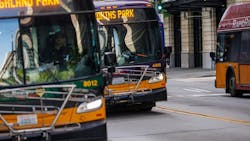King County Metro increasing bus operator training
On June 21, King County Metro celebrated the graduation of 54 part-time operators to full-time status. June also marked the agency’s highest number of full-time operators since 2021. In addition, the agency recently began training its first class of external candidates seeking to become full-time bus operators.
King County Metro has historically hired part-time operators who can eventually become full-time operators but the agency notes the switch to hiring external candidates fits its current workforce needs in delivering reliable all-day service. The agency plans to hire and train both part-time and full-time operators in the years ahead to meet the varied needs of riders.
According to the agency, nearly 1,000 people applied in just one week to its latest job posting. Every few weeks, a new class of selected qualified candidates will begin a six-week paid course at the agency’s Training and Safety Center.
King County Metro has recently made several enhancements to its training to increase safety, better support its operators and increase the number of graduates while maintaining high standards:
- Benefits: Prospective operators are paid during their training and receive a pay increase upon graduation. The agency has started offering benefits during training, too. King County Metro’s comprehensive package includes dental, disability and life insurance, flexible spending accounts, health, pension, pharmacy, retirement (deferred compensation) and vision.
- Content checklists: The agency has refined its day-by-day checklists of topics covered, ensuring consistency across classes, and sets up new operators for success in passing their tests and in delivering excellent transit service.
- Data: King County Metro is using daily quizzes, trainee and trainer surveys and other tools to see where additional instruction or a shift in approach or curriculum would be beneficial.
- Expanded radio communications preparation: The agency has added more training related to radio communications between bus operators and its Transit Control Center, which will increase coordination and information sharing during both regular service and unexpected developments such as emergencies, street closures or severe weather.
- Immersive technology: In addition to time on the road and on the training track, King County Metro has a virtual reality driving experience to strengthen confidence and skills.
- Improved training materials: As well as practical, verbal and written instruction and materials, King County Metro has added videos that can be viewed at any time. The agency notes it received positive feedback that the videos were particularly helpful for building confidence in more challenging areas.
- In-service training: After prospective operators complete their six-week training course and pass required tests, the agency has added four weeks of in-service work. During this time, new operators gain additional experience and skills and earn their qualifications to drive specific buses and routes, with one-on-one support from experienced operators. There are also training refreshers and ride-checks after 30 and 60 days.
- Language access: While being able to communicate in English is an expectation of all operators per federal law, the agency has made its materials easier to understand and are developing additional in-language support for its linguistically diverse classes of future operators.
- Mentorships: Earlier this year, King County Metro and labor partner Amalgamated Transit Union 587 kicked off Mentors Moving Metro, which pairs many of the agency’s new operators with an experienced operator. In addition to sharing expertise, the agency says programs like this have been shown to increase employee retention and job satisfaction and the agency hopes to expand the pilot program and to introduce it to other King County Metro divisions.
- More learning time: Based on feedback from students, the agency has increased the amount of time students have to learn—with class length doubled from four hours per day to eight hours per day, giving students more time operating the bus, practicing their skills and receiving instruction from training staff.
- Onboarding training: In addition to an existing “Welcome to Metro” training, trainees now receive three additional courses: “De-escalation methods,” “The Way We Work Together” and “We are Racially Just.” The agency notes the trainings can now be completed via an electronic tablet that is provided.
- Continuous improvement: As students graduate, King County Metro training staff are meeting regularly to assess what is going well and what can be improved. The agency recently amended the training schedule to provide more support to students when they first arrive at the bus base.
